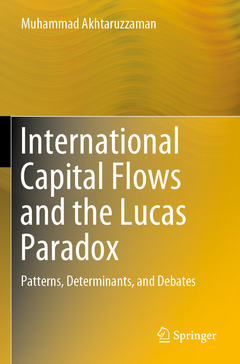International Capital Flows and the Lucas Paradox, 1st ed. 2019 Patterns, Determinants, and Debates
Auteur : Akhtaruzzaman Muhammad

This book offers a comprehensive analysis of the debates on international capital flows, and presents a new evidence-based answer to the long-standing question of why capital doesn?t tend to flow from rich to poor countries as predicted by standard neoclassical theory ? a puzzle known as the Lucas paradox. Further, the book reviews alternative approaches to conventional estimates of the marginal product of capital (MPK) and considers whether these estimates actually help us understand observed international capital flows.
A rigorous quantitative approach is subsequently used to provide clear empirical evidence on the determinants of capital flows across borders. The findings of this empirical analysis suggest that generous economic policies on capital account convertibility are more influential than differences in institutional quality in terms of determining international capital flows. In closing, the relative importance of various types of political risk (e.g. expropriation and corruption) is examined. After determining that expropriation risk has one of the greatest effects on foreign direct investment (FDI), the book proposes an appealingly intuitive explanation for the lack of FDI flows to many capital-scarce developing countries.
Chapter 1: Review of the Neoclassical Theory of Capital Flows and Related Empirical.- Chapter 2: The Lucas Paradox: Alternative Estimates of Marginal Product of Capital.- Chapter 3: Estimating the Determinants of Capital Inflows Using Cross-Sectional Data.- Chapter 4: Panel and Non-Linear Models of Capital Inflows.- Chapter 5: Do Foreign Investors Fear Expropriation? Effects of Political Risk on FDI.- Chapter 6: Conclusion.
Muhammad Akhtaruzzaman is Senior Lecturer at Toi Ohomai Institute of Technology, Rotorua, New Zealand. His research interests focus on international macroeconomics, empirical macroeconomics, development economics, and business and management.
Provides a clear answer to the long-standing debate on the determinants of capital flows across borders
Presents an evidence-based answer to the question of why capital doesn’t flow from rich to poor countries
Suggests clear policy implications for developing and emerging market economies based on robust empirical analysis
Investigates the determinants of international capital flows using a large sample of developing and emerging economies
Date de parution : 08-2020
Ouvrage de 203 p.
15.5x23.5 cm
Disponible chez l'éditeur (délai d'approvisionnement : 15 jours).
Prix indicatif 105,49 €
Ajouter au panierDate de parution : 07-2019
Ouvrage de 203 p.
15.5x23.5 cm
Disponible chez l'éditeur (délai d'approvisionnement : 15 jours).
Prix indicatif 105,49 €
Ajouter au panierThème d’International Capital Flows and the Lucas Paradox :
Mots-clés :
international capital flows; Lucas Paradox; foreign direct investment; marginal product of capital; capital account convertibility; capital account openness; capital account liberalization; capital controls; developing economy; emerging economy; neoclassical economics; capital flows; expropriation risk; fiscal policy; monetary policy; total factor productivity; gross capital inflow; net capital inflow; FDI



